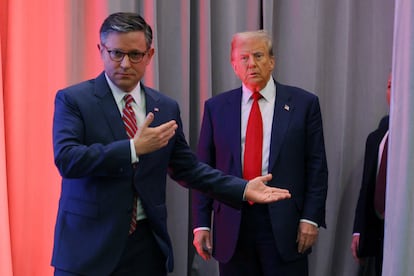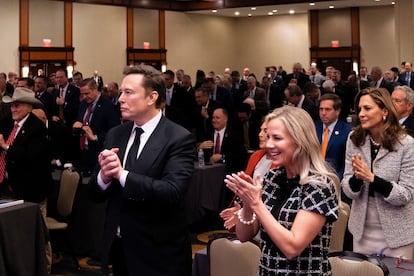Republicans narrowly retain control of House of Representatives
With this victory, Trump’s party controls the executive, legislative and judicial powers. The president-elect met with House Republicans and joked about serving a third term


It took more than a week to confirm what seemed most likely. The Republicans will have a majority in the House of Representatives, albeit by a narrow margin. Donald Trump’s party not only retains the House, but has also won the Senate. Added to this is the White House and a conservative supermajority in the Supreme Court. The executive, legislative and judicial branches will all fall under the same political power in a GOP trifecta, at least for the next two years.
House Minority Leader Hakeem Jeffries congratulated Republicans on Wednesday evening as some mainstream media outlets finally declared victory for Trump’s party. “House Democrats gave it our all, running aggressive, forward-looking and people-centered campaigns,” Jeffries said in a statement. “While we will not regain control of the Congress in January, falling just a few seats short, House Democrats will hold Republicans to a razor-thin majority. That is unprecedented in a so-called presidential wave election,” he added.
Democratic House leaders had pressured Joe Biden to withdraw from the re-election race because they feared being swept out of Congress. In the end, they lost control of the Senate and failed to win control of the House.
The Republican majority will be very tight in a House with 435 members. The Republicans have secured the 218 seats that give them an absolute majority and are still ahead in the count in four other districts. A hypothetical majority of 222 members to 213, similar to the one they have enjoyed for the past two years (it has varied according to ups and downs) will be difficult to manage, since there are representatives of very different sensibilities. For the past two years, the Republican group has evidenced internal division.
With Trump exercising his authority from the presidency, there is less of a chance that the House will break away from the fold on key issues. But Trump himself will help, at least temporarily, to weaken that majority, as he has already decided to name three congresspeople to his administration team: Elise Stefanik, representative for New York and the next ambassador to the UN; Mike Waltz of Florida, who will serve as national security advisor; and the controversial Matt Gaetz, also a congressman from Florida, who is nominated for attorney general and has already announced he is giving up his seat. In their constituencies, which have a clear Republican majority, early special elections will have to be held to fill the vacancies.
Control of Congress is vital to advancing the president's legislative agenda, including tax cuts and immigration laws. Any restructuring or closing of federal agencies would also have to go through the legislature. Approval by both chambers is needed for all bills, including appropriations and the bill to raise the federal debt limit.
President-elect Trump met with Republican lawmakers on Capitol Hill on Wednesday, stopping there before heading to the White House to meet with current President Joe Biden. Trump said he plans to appoint up to 15 lawmakers to positions in his administration, although he will try not to appoint them all at once so as not to leave Republicans in a minority.
The richest man in the world, Elon Musk, attended the meeting as a guest, sitting in the front row after arriving with Trump from Florida on the latter’s plane. The billionaire received a standing ovation when the president-elect mentioned him in his speech. Trump has just asked him to carry out a drastic reform of the administration, as he has been talking about for months.

Back in Washington for the first time since his election victory, Trump told Republican lawmakers: “It’s nice to win.” In his brief speech, he stressed that his election results had been better than that of the lawmakers themselves, although he exaggerated, claiming a lead of 7.1 million votes over Kamala Harris, when the still-unfinished count indicates a difference of about three million.
In any case, the congressmen applauded him wildly as they pointed their cellphones at him. “I suspect I won’t be running again unless you say, ‘He’s so good we’ve got to figure something else out,’” Trump said, apparently as a joke, about a very serious matter: the limitation of presidential terms, which the 22nd Amendment to the Constitution sets at a maximum of two, even if they are not consecutive, as in this case. Trump is already flirting with the idea of seeking another term.
At the same meeting, but without Trump or Musk in attendance, House Republicans decided to use their majority to re-elect the current speaker, Mike Johnson. There was no possibility of another candidate who could generate a greater consensus. Trump himself had shown his support for Johnson. In addition, the Republicans approved a rule aimed at avoiding another impeachment of the president, raising the threshold to make the move to nine lawmakers.
The House of Representatives is completely renewed every two years. The next midterm elections will be on November 3, 2026. In the Senate, one-third of the senators are elected every two years, since the terms are for six years. Republicans have secured a majority of 53 of the 100 seats in the Senate and, although there is still a long way to go, the electoral map for 2026 does not offer the Democrats much hope of taking the four seats they would need to claw back the majority from the Republicans.
Sign up for our weekly newsletter to get more English-language news coverage from EL PAÍS USA Edition
Tu suscripción se está usando en otro dispositivo
¿Quieres añadir otro usuario a tu suscripción?
Si continúas leyendo en este dispositivo, no se podrá leer en el otro.
FlechaTu suscripción se está usando en otro dispositivo y solo puedes acceder a EL PAÍS desde un dispositivo a la vez.
Si quieres compartir tu cuenta, cambia tu suscripción a la modalidad Premium, así podrás añadir otro usuario. Cada uno accederá con su propia cuenta de email, lo que os permitirá personalizar vuestra experiencia en EL PAÍS.
¿Tienes una suscripción de empresa? Accede aquí para contratar más cuentas.
En el caso de no saber quién está usando tu cuenta, te recomendamos cambiar tu contraseña aquí.
Si decides continuar compartiendo tu cuenta, este mensaje se mostrará en tu dispositivo y en el de la otra persona que está usando tu cuenta de forma indefinida, afectando a tu experiencia de lectura. Puedes consultar aquí los términos y condiciones de la suscripción digital.








































